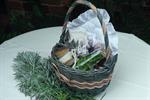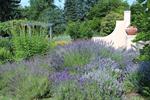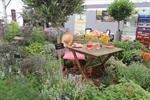 Study Herb Culture as part of the certificate course, then choose modules in either aromatherapy, culinary herbs, medicinal herbs, lavender and scented plants.
Study Herb Culture as part of the certificate course, then choose modules in either aromatherapy, culinary herbs, medicinal herbs, lavender and scented plants.
- A flexible course to suit anyone interested in learning more about herb culture.
- Learn to propagate, grow and produce horticultural herb products
- Start your own herb farm or nursery business
To do this you need to develop knowledge and skills in both generic horticulture, as well as growing, harvesting, using and marketing of herbs (and herb products). This course covers both.
The first half of the course provides a foundation for the second half, giving you a broad understanding of how to identify and grow any type of plant. This foundation is needed before narrowing your focus more specifically to herbs.
The first part of the course covers:
- Introduction to Plants (taxonomy, plant families, basic botany),
- Plant Culture (planting, potting, plant selection, pruning, irrigation, tools and machinery),
- Soils and Nutrition (soil structure, chemistry, nutrition, potting media),
- Plant Identification and Use (seed harvesting and storage, germination treatments, cuttings) and
- Pests, Diseases and Weeds (identification and treatments -chemical and non chemical).
DURATION
The course requires approximately 700 hours of study.
START DATE
You can start the course at any time - to suit YOU.
 COURSE OBJECTIVES
COURSE OBJECTIVES
The objective of the course is to:
- understand the binomial system of plant classification and to develop resource contacts for information about herbs.
- develop a broad perspective of the scope of herb species and varieties, their culture and uses, and an insight into which varieties are more commonly available.
- make a detailed study of the most commonly grown herb varieties.
- know how to make a wide range of herb crafts and cook a wide variety of herb flavoured foods.
- make an awareness of medicinal and toxic chemical properties of herbs (both in general and selected specific terms).
- develop an awareness of the work procedures involved in operating a herb farm and how to harvest and provide post harvest treatments to herb produce.
- develop knowledge of how to plan and manage a maintenance program in an ornamental garden or park.
- design and implement a marketing program for a business operating in the herb industry.
COURSE STRUCTURE
This Certificate in Horticulture involves two parts:
- CORE STUDIES - involves at least 350 hours, divided into 15 lessons, approximately half of the course.
- STREAM (ELECTIVE) STUDIES - a further 350 hrs of study, specifically on herb identification, using herbs, herb farming and landscaping with herbs.
CORE STUDIES: Core studies cover the following:
1. Introduction to Plants
Nomenclature and taxonomy, the plant kingdom, genus, species, hybrids.
2. Parts of the Plant
How plants grow, plant structure, parts of the flower and leaf, modification of stems and roots.
3. Plant Culture - Planting
How to plant and protect newly planted specimens, terms like: annuals, biennials, perennials, deciduous, evergreen and herbaceous plants.
4. Plant Culture - Pruning
Purpose for pruning, rules for pruning, how to prune.
5. Plant Culture - Irrigation and Machinery
Different irrigation systems, components of an irrigation system, designing an irrigation system, maintenance in the garden and for tools.
6. Soils & Media
Soil classifications, testing soil, potting mixes, the U.C. System, ingredients of potting mixes.
7. Soils & Nutrition
Fertilisers - deficiencies and toxicities, N:P:K ratios, salting, fertiliser programming, compost.
8. Propagation - Seeds & Cuttings
How to propagate plants with the two easiest techniques, propagating mixes, cold frame construction, after care for young plants.
9. Propagation - Other Techniques
Other methods to increase plant numbers - budding, grafting, layering, division and tissue culture.
10. Identification and Use of Plants
How are plants used in the landscape, how to choose and purchase plants, selecting plants suitable for the climate and site.
11. Identification and Use of Plants
Problems with plants and choosing plants for problem sites.
12. Identification and Use of Plants
Indoor and Tropical Plants, flowers, herbs, bulbs, ferns.
13. Pests
Identifying and controlling pests, chemical and natural methods for control, chemical safety precautions.
14. Diseases
Identifying and controlling diseases, plant pathology, fungi, viruses, non pathogenic problems, interactions with the host and the environment.
15. Weeds
Identifying and controlling weeds, chemical terminology.

Stream Studies: Herbs
The stream studies are made up of three modules, as follows:
Herb Culture (outlined below)
PLUS any TWO of the following:
EXAMS There are two exams for the core and 3 for the stream (one for each stream module)
Exam fees are extra.
Herb Culture Module
This module is divided into 12 units, each containing one or more lesson.
Unit 1: Introduction To Herb Culture
- Lesson I Introduction to herbs - classification of herbs; use of a botanical key
- Lesson II Cultural techniques - planting, drainage, feeding, mulching, composting, pruning
- Lesson III Propagation techniques - propagation mixes, growing structures, cuttings, seed, separation and division, layering
- Lesson IV Identification of plant health problems – pests, disease, frost, heat, water stress
Unit 2: Using Herbs
- Lesson I Processing and uses of herbs - medicinal, culinary, perfumes, dyes, oils, distillation
- Lesson II Harvesting and storage – drying; freezing, fresh storage, when and how to harvest
Unit 3: The Mints (Lamiaceae)
- Lesson I Mentha species - peppermint, spearmint, applemint, wintermint, pennyroyal, corsican, ginger mint etc.
- Lesson II Lavender (Lavendula varieties) and thyme (Thymus).
- Lesson III : Assorted Lamiaceae varieties: Lemon Balm, Hyssop, Rosemary, Bee Balm (Monarda), Basil, Savory, Marjoram, Sage.
Unit 4: The Daisies (Asteraceae)
- Lesson I : Artemisia species...Southernwood, Wormwood, Tarragon, Mugwort.
- Lesson II : Miscellaneous Asteraceae: Chamomile, Tansy, Safflower, Costmary, Yarrow, Calendula, Dandelion etc.
Unit 5: The Parsley Family (Apiaceae)
- Lesson I : Parsley, Coriander, Dill, Caraway, Angelica, Cumin, Fennel, Lovage, Sweet Cicely
Unit 6: The Onion Group
- Lesson I : Chives, Leek, Garlic chives, Tree onion, Welsh onion, etc.
- Lesson II : Garlic
Unit 7: Other Herbs
- Lesson I : Rosaceae (Rose, Burnet, Strawberry, blackberry, etc)
- Lesson II : Miscellaneous: Lemon grass, Lemon verbena, Bay, Sorrel, Dock, Juniper, Horseradish, Evening Primrose, etc.
- Lesson III : Scented Geraniums; Australian Natives, Eucalyptus and Others
Unit 8: Pests & Diseases
- Lesson I : Companion Planting
- Lesson II : Natural Pest Control: Herb sprays, biological control, etc.
Unit 9: Landscaping
- Lesson I : Landscape Design Principles and Practices: How to draw a landscape plan
- Lesson II : Home Gardening With Herbs; Cottage gardens, hedges & borders, tubs, baskets, kitchen gardens, herb lawns, herb indoor plants.
- Lesson III : Public Landscaping: Historic herb grdens (Knot gardens etc), herbs for low maintenance & colour in parks..etc.
Unit 10: Herb Farming 1
- Lesson I : Establishing & Operating a Herb Nursery: Open ground vs container growing, nursery layout, potting soils, pots and labels, marketing, etc.
Unit 11: Herb Farming 11
- Lesson I : Establishing & Operating a Herb Farm: Soil Preparation and management (plastic mulch, organic mulches, cultivation), row cropping.
Unit 12: Herb Farming 111
- Lesson 1 : Evaluating Herb enterprises, assessing market demand. Deciding how to proceed.
The Herb Industry is Thousands of Years Old
Historically the main/most important use of herbs was medicinal. The use of herbs in this way stretches back to prehistoric times. Just how much of a scientific basis existed to early herbal knowledge is open to question. Early man undoubtedly learned about using herbs through trial and error over along period of time, gradually establishing traditional uses (medicinal and other) for herbs.
Over 5000 years ago Sumerian civilisation described medicinal uses for plants such as laurel, caraway and thyme. The first known Chinese herb book dated to 2700 BC and lists 365 medicinal plants. The Egyptians are known to have used garlic, opium, castor oil, coriander, mint, indigo and other plants for medicines and dyes around 1000BC. Hippocrates and other ancient Greeks ignored much of the tradition and superstition which had surrounded herbs up until their time, and began to look at herbs (from a medicinal viewpoint) in a scientific manner. Herb books from ancient Greece became established references down through the centuries and were in common use right up until the beginnings of modern medicine.
Modern science has not been kind to the knowledge built up over thousands of years about herbs. Natural remedies were replaced by synthetic drugs, natural flavourings have been replaced by synthetic food additives, plant dyes by chemical colourings and on it goes.
Today there seems to be some trend towards a more balanced approach to considering the values of this knowledge of the past. A revival of interest in herbs has in some areas perhaps been rightly considered to be fanatical; but no more fanatical than the interest in modern science which disregarded the good uses of herbs over the last couple of centuries.
WHAT NEXT?
Register to Study - Go to “It’s Easy to Enrol” box at the top of the page and you can enrol now.
or
Get Advice – Email us at info@acsedu.co.uk OR
Use our FREE COUNSELLING SERVICE to contact a tutor
CLICK TO CONTACT US